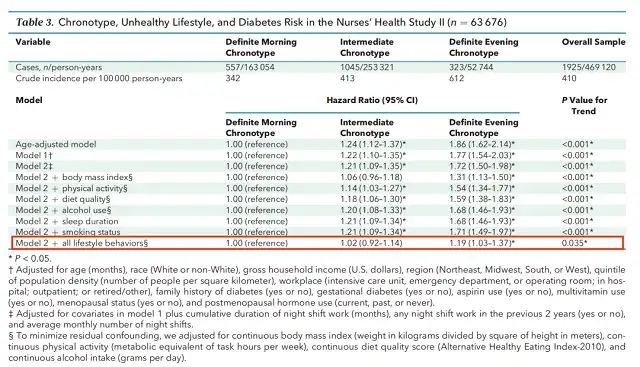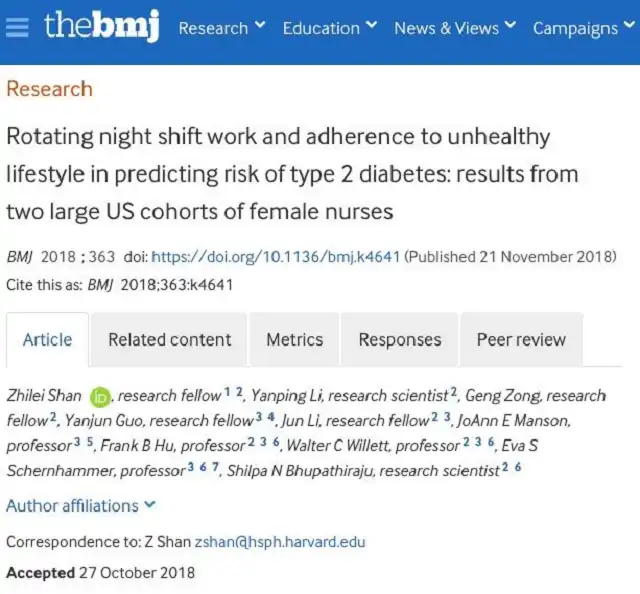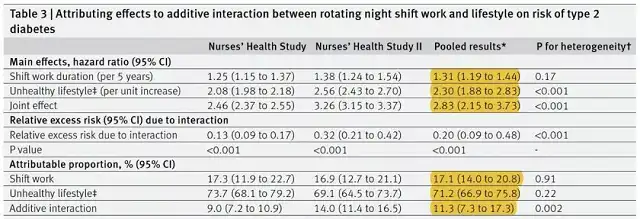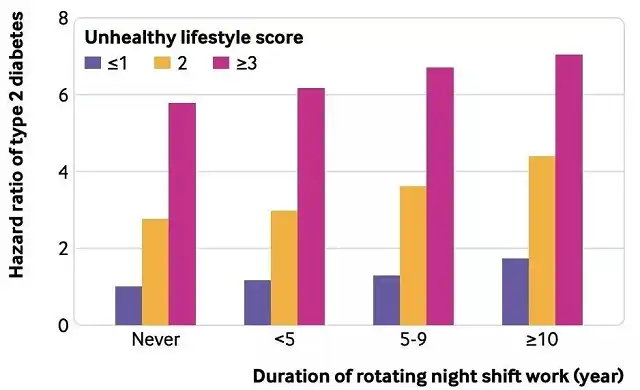Working Night Shifts Increases the Risk of Type 2 Diabetes
- EB Virus Could Be Infected by Kiss: A Hidden Threat Linked to Cancer
- The Silent Threat: How Gas Stoves Pollute Our Homes and Impact Health
- Paternal Microbiome Perturbations Impact Offspring Fitness
- New Report Casts Doubt on Maradona’s Cause of Death and Rocks Manslaughter Case
- Chinese academician unable to provide the exact source of liver transplants
- Early Biomarker for Multiple Sclerosis Development Identified Years in Advance
Working Night Shifts Increases the Risk of Type 2 Diabetes
- AstraZeneca Admits for the First Time that its COVID Vaccine Has Blood Clot Side Effects
- Was COVID virus leaked from the Chinese WIV lab?
- HIV Cure Research: New Study Links Viral DNA Levels to Spontaneous Control
- FDA has mandated a top-level black box warning for all marketed CAR-T therapies
- Can people with high blood pressure eat peanuts?
- What is the difference between dopamine and dobutamine?
- How long can the patient live after heart stent surgery?
Latest Research: Working Night Shifts Increases the Risk of Type 2 Diabetes.
How many night shifts have you worked in the past year? If you can’t remember, a touch to your head might provide the most honest answer.
Cold-headedness is not the only side effect; working night shifts may indeed lead to health issues, specifically, Type 2 diabetes.
Latest Study: Night Owls More Prone to Diabetes
On September 12th, the “Annals of Internal Medicine” published the results of a prospective cohort study evaluating the relationship between the sleep patterns of middle-aged nurses and their risk of unhealthy lifestyles and diabetes.

Source: Annals of Internal Medicine
Sleep patterns, also known as chronotypes, are partly determined by genetics and refer to a person’s preference for going to bed and waking up early or late.
The study sample included 63,676 nurses aged between 45 and 62 in 2009, with no history of diabetes, cardiovascular disease, or cancer. Participants self-assessed their sleep patterns and lifestyles through questionnaires. Those with a typical “evening chronotype,” often referred to as night owls, were characterized by going to bed late (around 3 AM) and waking up late (around 12 PM) or maintaining high energy levels at 10 PM.
There were five questionnaire options: “definite morning type,” “definite evening type,” “more morning type,” “more evening type,” and “neither.” Those who fell into the last three categories were categorized as “intermediate.”
The assessment of lifestyle dimensions included body mass index, physical health, diet quality, alcohol consumption, sleep duration, and smoking habits.
The study found that middle-aged nurses with an “evening chronotype” were 54% more likely to have unhealthy lifestyles compared to those with a “morning chronotype.” Among 469,120 person-years, 1,925 individuals were diagnosed with diabetes. Evening chronotype was associated with an increased diabetes risk compared to morning chronotype (HR=1.72, CI, 1.50–1.98).
However, after adjusting for lifestyle factors, the association between evening chronotype and diabetes risk was attenuated. After simultaneously adjusting for six lifestyle habits, the relationship between evening chronotype and diabetes risk nearly disappeared but remained statistically significant (adjusted HR=1.19; CI, 1.03–1.37).

The first author of the study, Dr. Sina Kianersi, stated, “Interestingly, night owls working night shifts did not exhibit this increased risk of diabetes, suggesting that aligning work schedules with natural rhythms may be beneficial.”
Follow-Up Study: Night Shifts Increase Diabetes Risk
Coincidentally, a study published five years ago in the “British Medical Journal (BMJ)” indicated that an additional five years of rotating night shift work increased the risk of Type 2 diabetes by 1.31 (CI, 1.19–1.44).
Zhilei Shan and colleagues conducted a prospective cohort study aiming to evaluate the relationship between the duration of “rotating night shift work” and “lifestyle factors” with the risk of Type 2 diabetes.
An “unhealthy lifestyle” was defined as smoking, less than 30 minutes of moderate-to-vigorous physical activity per day, a diet score ranking below the top 60%, and a BMI of 25 or higher.

Association of night shift work and unhealthy lifestyle with risk of type 2 diabetes: from two cohorts of female nurses in the United States (Source: BMJ )
The study data was based on the Nurses’ Health Study (NHS) from 1988 to 2012 and NHS II from 1991 to 2013, including 143,410 nurses who were initially free of Type 2 diabetes, coronary heart disease, or cancer.
In other words, when these nurses initially joined the study, they were healthy and active.
This allowed for a better observation of the impact of decades of night shift work on their health.
The researchers clearly defined “rotating night shift” as working at least three night shifts per month in addition to regular daytime work.
The study results showed that during a follow-up period of 22 to 24 years, 10,915 nurses developed Type 2 diabetes.
Compared to nurses without night shift work experience and without unhealthy lifestyle habits:
- Each additional 5 years of rotating night shift work increased the risk of Type 2 diabetes by 1.31 (95% CI 1.19–1.44).
- Each additional unhealthy lifestyle factor increased the risk of Type 2 diabetes by 2.30 (95% CI 1.88–2.83).

Risk of type 2 diabetes due to night shift work (Source: this paper)
For nurses with both “rotating night shift work” and “unhealthy lifestyle habits,” the risk of Type 2 diabetes increased by 2.83 (95% CI 2.15–3.73), with a significant synergistic effect (P<0.001).
Among these, the impact of rotating night shift work accounted for 17.1%, unhealthy lifestyle habits accounted for 71.2%, and the combined effect accounted for 11.3%.

The impact of unhealthy lifestyle and night shift work on the risk of type 2 diabetes ( Source: this paper )
In conclusion, the authors stated that both rotating night shift work and an unhealthy lifestyle increase the risk of Type 2 diabetes, and the two factors have a synergistic effect.
However, the study’s findings also suggest that, relative to night shifts, an unhealthy lifestyle may have a greater impact on the risk of Type 2 diabetes.
Therefore, the authors advise healthcare professionals to focus on maintaining a healthy lifestyle to prevent Type 2 diabetes. This includes not smoking, ensuring at least 30 minutes of moderate-to-vigorous physical activity daily, and following a healthy diet. Such preventive measures are likely more reliable.
After all, night shifts are something you’ll probably have to work your entire life.
Working Night Shifts Increases the Risk of Type 2 Diabetes
References:
[1] https://www.news-medical.net/news/20230912/Evening-chronotype-linked-to-unhealthy-lifestyles-and-increased-diabetes-risk-reveals-cohort-study.aspx
[2] Kianersi S, Liu Y, Guasch-Ferré M, et al. Chronotype, Unhealthy Lifestyle, and Diabetes Risk in Middle-Aged US Women: A Prospective Cohort Study[J]. Annals of Internal Medicine, 2023.
[3] Shan Z, Li Y, Zong G, et al. Rotating night shift work and adherence to unhealthy lifestyle in predicting risk of type 2 diabetes: results from two large US cohorts of female nurses[J]. Bmj, 2018, 363.
(source:internet, reference only)
Disclaimer of medicaltrend.org
Important Note: The information provided is for informational purposes only and should not be considered as medical advice.



